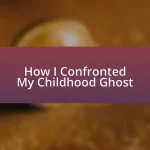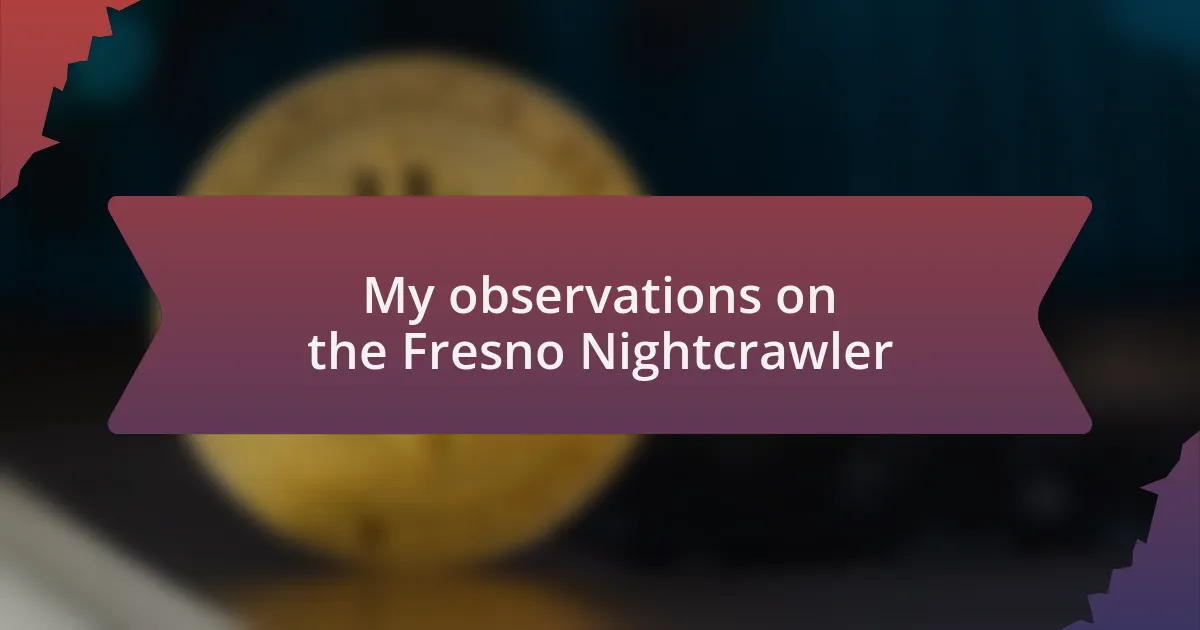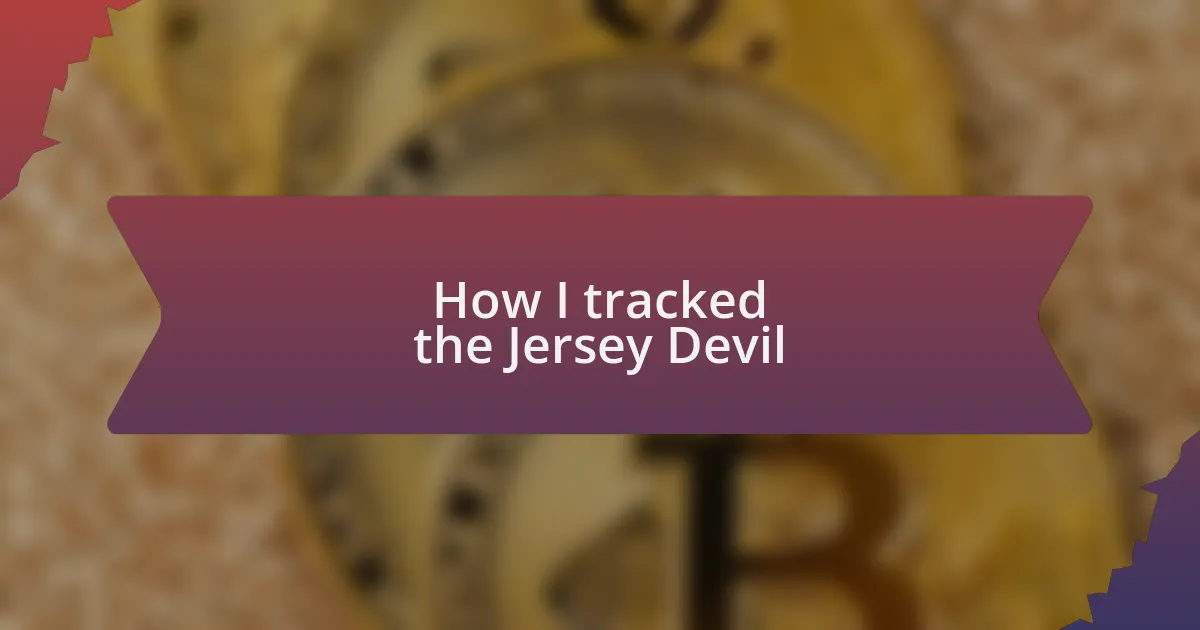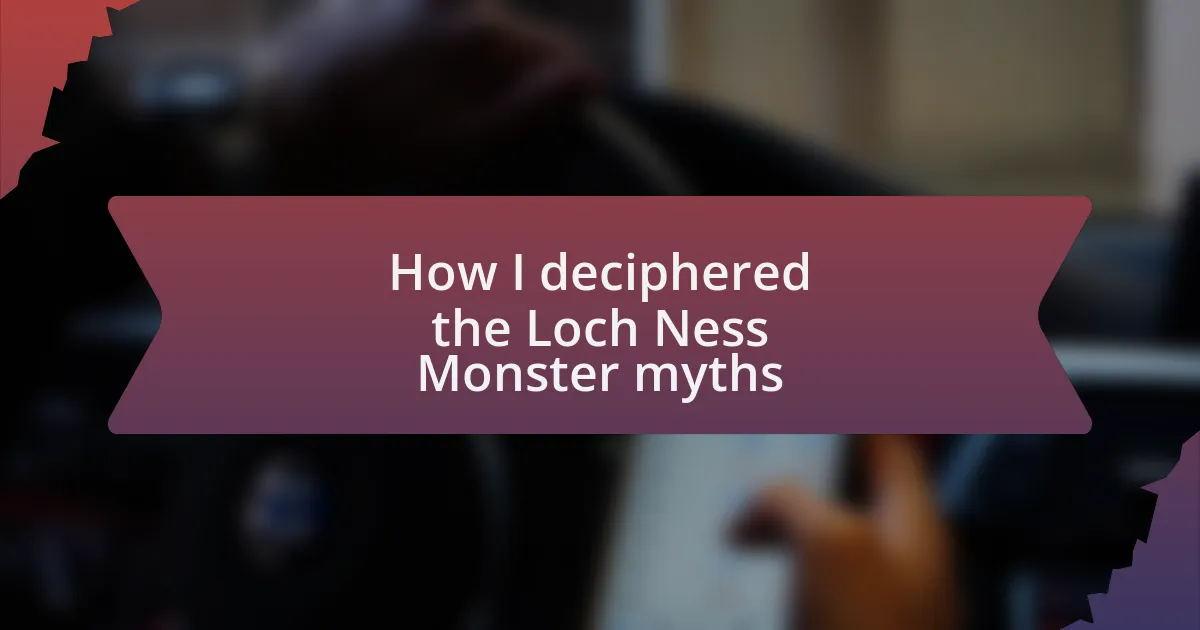Key takeaways:
- Cryptid enthusiasts share a deep emotional connection to their interests, often stemming from personal experiences that shape their fascination with mysterious creatures.
- Paranormal podcasts play a crucial role in fostering community and educating listeners about the cultural significance and history of cryptids, while also encouraging personal reflection on beliefs.
- Common misconceptions include the belief that all enthusiasts blindly accept evidence and that they are primarily conspiracy theorists, whereas many are educated individuals driven by curiosity.
- Sharing personal experiences as a cryptid enthusiast not only builds community but also promotes personal growth and provides therapeutic benefits through the expression of emotions.
Author: Evelyn Hartman
Bio: Evelyn Hartman is a contemporary author known for her evocative storytelling and rich character development. With a background in psychology, she weaves intricate narratives that explore the complexities of human relationships and personal growth. Her debut novel, “Whispers in the Wind,” garnered critical acclaim and established her as a powerful voice in modern literature. Evelyn resides in the Pacific Northwest, where she draws inspiration from the vibrant landscapes and diverse communities around her. When she’s not writing, she enjoys hiking, gardening, and spending time with her two rescue dogs.
Understanding cryptid enthusiasts
Cryptid enthusiasts embody a unique blend of curiosity and passion that often goes beyond mere fascination. I remember attending a local cryptid convention where enthusiasts eagerly shared personal encounters, each person’s story colored by excitement and belief. Their enthusiasm is infectious, creating a space where skepticism is welcome but exploration is paramount.
These individuals often seek not only to uncover hidden truths but also to forge connections with like-minded people. It’s not uncommon to see friendships blossom over late-night campfire discussions about Sasquatch sightings or the elusive Loch Ness Monster. Have you ever wondered what it feels like to sit around a fire, with eyes wide open, theorizing about creatures that may or may not exist? For many, it’s a thrilling journey that merges the adventurous spirit with a sense of community.
Understanding cryptid enthusiasts requires empathy and an appreciation for the broader human experience. Their quest isn’t just about the creatures; it reflects a deeper longing for mystery and the unknown in our lives. When I think about it, isn’t it fascinating how the intrigue of cryptids can remind us of our own search for meaning in a world that’s often too predictable?
Importance of paranormal podcasts
Podcasts related to the paranormal serve as a bridge between curiosity and community for many enthusiasts. I recall a time when I stumbled upon a podcast that dissected theories about urban legends; the host’s passion and enthusiasm sparked my own intrigue. Each episode felt like an engaging conversation, drawing listeners into a world where the unexplained is not only discussed but celebrated, ultimately fostering a sense of belonging among those intrigued by the mysteries of life.
Moreover, the importance of these podcasts lies in their ability to educate and inform. I often find myself learning about legends and folklore that I had never encountered before. Have you ever experienced that moment of realization when a story resonates with you so deeply that it sparks your imagination? These podcasts encourage listeners to explore historical contexts and cultural significance behind various cryptids, enhancing our overall understanding of the paranormal landscape.
Listening to paranormal podcasts also prompts listeners to reflect on their own beliefs and experiences. I remember a particular episode where the host interviewed a guest who shared a personal encounter with an unexplained phenomenon. This candid sharing created a space for me to evaluate my own perceptions of the unknown. Isn’t it interesting how engaging with these narratives can challenge our views and invite us to consider what we might deem possible in the unseen world around us?
Key themes in cryptid discussions
When examining key themes in cryptid discussions, one prevalent topic is the emotional connection enthusiasts feel toward their favorite creatures. I remember listening to an episode where a guest passionately described their childhood experience in the woods, where they first heard about Bigfoot. Their enthusiasm led me to reflect on how personal experiences often shape our fascination with these beings, turning abstract myths into relatable stories that resonate on a deeper level.
Another theme that frequently arises is the interpretation of evidence—both anecdotal and physical. I once participated in a lively debate on a forum about a supposed photograph of the Loch Ness Monster. Some argued it was merely a trick of light, while others believed it was a groundbreaking discovery. Isn’t it fascinating how a single piece of evidence can ignite such passionate discussions, revealing not just our curiosity but also our need for validation in a world filled with uncertainty?
Lastly, the cultural and historical context often surfaces, enriching the narrative around cryptids. In one podcast, I heard a scholar explain the significance of the Chupacabra in Latin American folklore. It was eye-opening to learn how these stories reflect societal fears and hopes. Have you ever considered how the myths we cherish might mirror our own experiences? This intertwining of culture and legend adds layers of meaning to our discussions, making them not just about the creatures themselves but about us as a society.
Common misconceptions about cryptids
One common misconception about cryptids is that believers automatically accept every account or piece of evidence as factual. I’ve seen this firsthand in conversations where someone passionately shares a sighting, only for skeptics to dismiss it outright. It’s crucial to remember that many enthusiasts approach the topic with a mix of curiosity and critical thinking, often analyzing evidence rather than accepting it at face value. Doesn’t that make you wonder how often our own biases influence what we accept as truth?
Another prevalent myth is that cryptids are solely the product of folklore or legends with no basis in reality. I recall attending a local meetup where members enthusiastically shared their own encounters or strange experiences, which often added layers to the lore we typically associate with these creatures. It was refreshing to hear personal stories that intertwine with local history—how many of us have considered that maybe there’s a grain of truth hidden within these tales?
Finally, there’s a tendency to view all cryptid enthusiasts as conspiracy theorists or fringe characters. My experiences in various online forums reveal a more diverse group—teachers, scientists, and creative professionals who just seek to understand the unknown. How can we overlook the fact that the quest for knowledge often drives passionate discussions? This blend of various backgrounds not only enriches the conversation but also highlights the universality of our desire to explore and understand mysteries beyond the conventional.
Personal insights from cryptid enthusiasts
Engaging with cryptid enthusiasts has opened my eyes to the genuine passion behind their pursuits. One particularly memorable conversation I had was with a retired engineer who dedicated years to investigating local sightings of the Chupacabra. His commitment was not just about proving the creature’s existence; it was driven by a longing to connect with nature and understand the mysteries that linger in our backyards. Isn’t it fascinating how personal motivations can shape the exploration of the unknown?
I’ve also noticed that many enthusiasts carry a deep sense of wonder, often recounting their own childhood experiences with ghost stories and mythical creatures. A close friend shared how a camping trip sparked his lifelong fascination with Bigfoot after he and his siblings heard strange noises near their tent at night. This emotional connection to childhood memories not only fuels their current interests but also creates a bridge between the past and present. Don’t you find it intriguing how our formative experiences can inform our adult curiosities?
Furthermore, I’ve learned that cryptid enthusiasts often face skepticism with grace, using it as a springboard for deeper discussions. During a recent podcast episode, a guest shared how pushback from friends only fueled her determination to dig deeper into the topic of lake monsters. Instead of feeling discouraged, she explored historical accounts and scientific explanations, weaving them into her narrative. This resilience in the face of doubt speaks volumes about their character, doesn’t it? It’s a reminder that exploration and discovery often thrive on challenges.
Benefits of sharing your experiences
Sharing your experiences as a cryptid enthusiast can foster an incredible sense of community. I recall joining a local gathering where everyone shared their own sightings and theories. Listening to others articulate their encounters created a palpable energy that made us feel less isolated in our interests. Isn’t it amazing how simply recounting a story can forge connections and build camaraderie among those who might otherwise feel like outsiders?
On a more personal note, delving into my own experiences has sparked unexpected personal growth. This past summer, I shared my encounter with a strange creature during a night hike, and to my surprise, it resonated deeply with several attendees. They opened up about their own experiences, leading to discussions that not only validated my feelings but also expanded my understanding of cryptid lore. Isn’t it fulfilling to see how sharing can inspire others to reflect on their own journeys?
Moreover, there’s a therapeutic aspect to recounting these tales. I’ve found that discussing my experiences helps me process the emotions tied to them. After sharing a particularly unsettling encounter my family had one night, I realized how cathartic it was to voice those fears and uncertainties. Why do you think it’s so important to express our stories? For many, it’s not just about the thrill; it’s about coming to terms with what we can’t explain.





